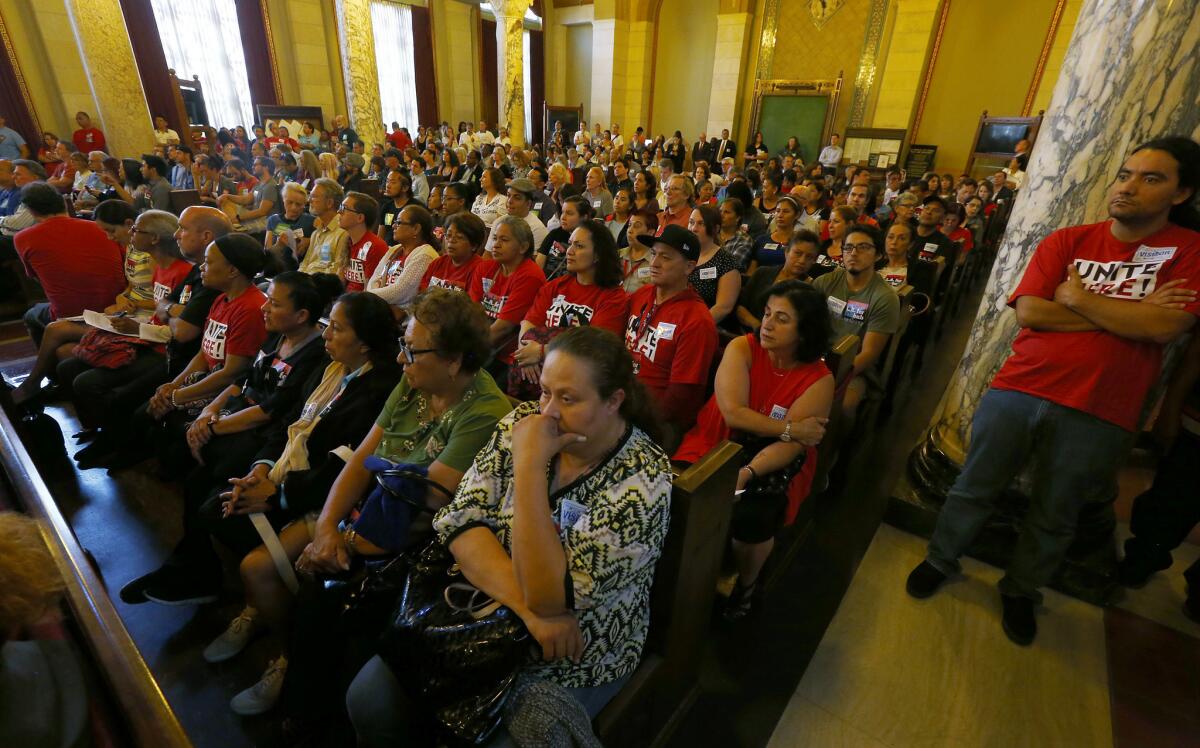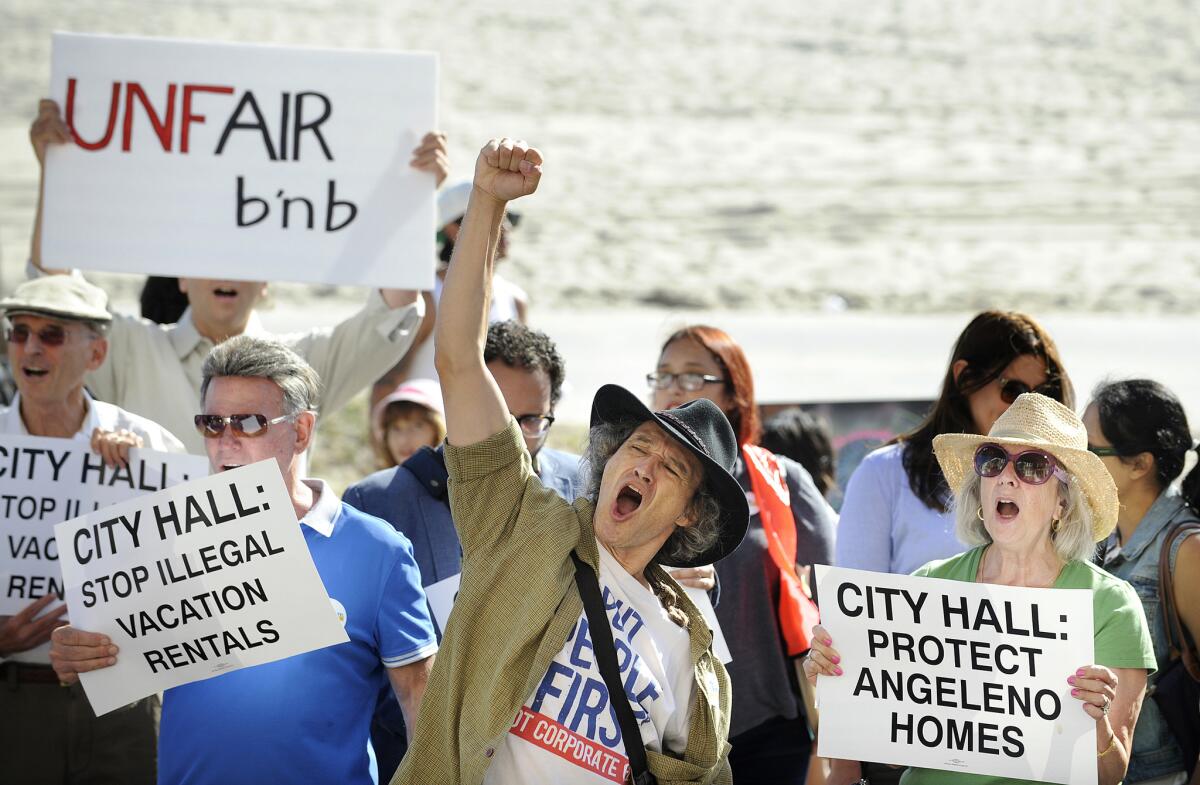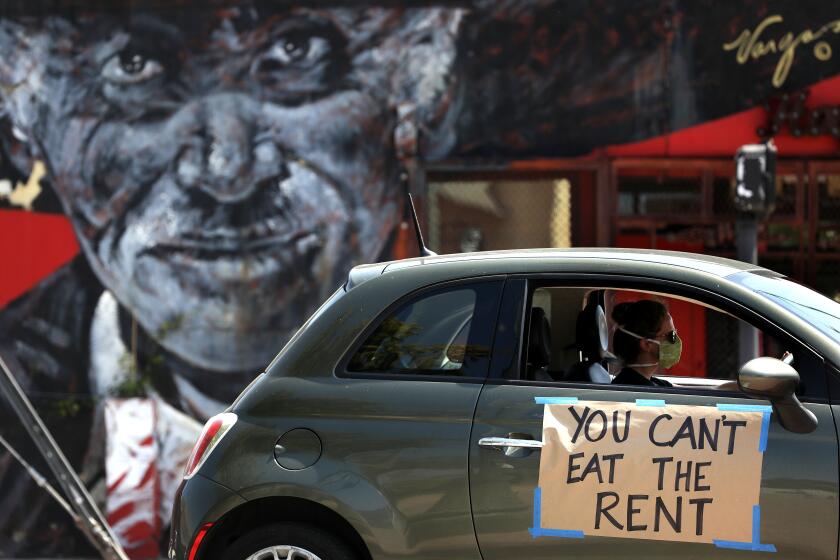Thousands of online listings are violating L.A.’s new short-term rental law

Tenant activists celebrated when Los Angeles ushered in new rules to clamp down on renting homes for short stays, saying the city needed to stop landlords who were running apartment buildings like hotels.
But more than a year after that law went into effect, many rental hosts appear to be ignoring it. Thousands of illegal rentals are still being advertised online, according to city officials and a Times analysis of listings on the popular platform Airbnb — and only a fraction have been penalized with fines.
The new law limits Angelenos to hosting short-term rentals in their “primary residence,” not in a second home or an investment property — a rule meant to ease the housing crisis. It also requires hosts to register with the city, which checks that they meet that and other requirements. Advertising an unregistered listing could be a way to try to dodge those rules.
The Times analysis found that as of early June, nearly 5,000 Airbnb listings for short-term rentals in Los Angeles lacked city registration numbers. The city, in turn, has estimated that on Airbnb, more than 6,000 listings are out of compliance — a number equal to roughly 42% of active listings on all platforms in Los Angeles.
So far, city officials have been able to identify roughly 2,600 properties in L.A. on several platforms, including Airbnb, that have failed to comply with the ordinance because they didn’t include a valid registration.
To combat the problem, L.A. has sent out two rounds of warning letters and issued more than 650 citations to rental hosts, imposing one-time fines of $500 each. City officials say that most scofflaws have fallen in line after getting the warning letters, and that there has been a 62% decrease in rental listings since L.A. started its enforcement efforts last November.
Expanded federal jobless benefits and an eviction moratorium have expired. And the biggest state protection against evictions could go away this month.
“These reductions are largely the result of staff spending an enormous amount of time helping hosts register, cleaning up data, and taking down illegal listings,” planning department spokesman Yeghig Keshishian said. “At the end of the day, our goal has always been to resolve these problems and achieve compliance.”
But the city has not imposed ongoing fines of $500 per day for illegal listings, one of the enforcement tools included in the new ordinance. Keshishian said that when enforcement began in November, they didn’t want to issue “weeks’ worth of fines when the end goal was always to protect our housing stock, not to exact fees.”
Nor has it penalized online platforms that host such listings, as the L.A. law allows. Keshishian said they had focused on hosts because it was easier to prove violations. To enforce the rules against platforms, he said, the city needs additional evidence to show that they “knew or ignored the fact that their hosts were not in compliance.”
Los Angeles entered into an agreement last year with Airbnb that required the platform to remove “categorically ineligible” listings identified by the city, including those in apartments covered by rent stabilization rules. But Airbnb did not have to remove any others until it rolled out a new system to facilitate sharing data with the city and removing illegal listings.
“People have been calling our office, complaining that the city has been telling residents that Airbnb has immunity,” said Nancy Hanna, a partner with the law firm Hadsell Stormer Renick & Dai, which has sued Airbnb on behalf of tenants.
In May, the Hadsell firm sent a letter complaining that enforcement was “woefully inadequate” and questioning city claims of success, pointing to a huge jump in the number of out-of-compliance rentals in Los Angeles between December and February, based on reports from a city contractor.
Keshishian said the increase was the result of thousands of rentals of previously “unknown” compliance being checked and determined to be unpermitted.
Airbnb, which reported spending more than $280,000 on lobbying and related expenditures in L.A. in the first half of this year, says it has not been fighting the enforcement process.
“Our desire is to make sure that the rules are working,” said Airbnb spokesman Christopher Nulty, adding that the planned system “puts enforcement tools in the hands of the city.”
“There’s never been any intention on our side to drag our feet,” Nulty said. “Our focus has been developing a system that works.” And as of today, he added, the system is “ready to go.”
In June, Airbnb announced it was launching that system to help with enforcement. Then the city abruptly put it on hold: Planning officials said Mayor Eric Garcetti’s office told them to hold off until the department had prepared a report on its financial effects.
Clamping down on illegal rentals could affect revenues from lodging taxes as L.A. faces a budget crunch. Planning officials argued in a report, however, that most guests would simply book legitimate rentals or hotels, resulting in little effect on tax revenue. The mayor’s office did not provide comment on the issue.
The decision to hold off on the new system aggravates some residents. “The city is dragging their feet to force Airbnb to adhere to the agreement they made,” said Judith Goldman, one of the co-founders of Keep Neighborhoods First, which pushed for the new rules amid concerns about “commercialized” rentals.

In February, Goldman said she was aghast to hear from the planning department that more than 10,000 possible violations of the ordinance had been identified — but no citations had been issued. Fines started to be handed down in late February, but tenants who have complained about illegal rentals remain dissatisfied.
“If you’re going to fine someone a one-time $500, they could cover that cost in two or three nights,” said Brian Averill, a Venice tenant whose building, the Ellison, has been embroiled in a legal battle over nightly rentals. “That seems incredibly ineffective. People are just going to see that as the cost of doing business and gladly pay it.”
Nulty, the Airbnb spokesman, countered that for the majority of hosts on their platform, “five hundred dollars is a lot of money ... and certainly sends a very clear message that the city of L.A. will not tolerate people hosting illegally.”
Some argue that the new rules have had a marked effect.
Chani Krich, co-founder of Homeshare Alliance Los Angeles, said that most of the hosts her group represents have been forced to stop because the city banned short-term rentals in rent stabilized apartments. Other owners who were renting an extra unit in a duplex or triplex were also thwarted.
“There was a mass exodus in November,” Krich said. “They basically just shut it down.”
Others say they have seen little change under the new law.
Another Venice renter, Yvonne Sjostrand, said she was frustrated that her landlord had not been cited for a revolving door of rentals at her rent-stabilized building. Strangers come and go, block the driveway, leave trash and bring in lots of guests, she complained. Other tenants have left in frustration with that and other issues at the building, Sjostrand said.
“We’ve been reporting it for years. Nobody does anything,” she said. Planning officials said they had received calls about that building and had referred the issue to another department for possible enforcement.
Another apartment building on the edge of Venice was cited for illegal rentals in April, but that fine had yet to be paid as of the end of July, and two residents there said the problems with night-to-night visitors had only worsened. A representative at that building, called the Westerly on Lincoln, did not respond to requests for comment on the citation.
Keshishian said that more than 9,000 listings had spurred warning letters from the city, but roughly 2,600 appeared to still be out of compliance after getting those initial warnings and are undergoing further investigation for possible citations. At the end of July, Hollywood led the city for properties identified as being in violation (167), followed by Venice (147) and downtown (144).
Although more than 600 properties have been cited with fines so far, the majority had not paid those fines as of late July, according to data provided by the City Attorney’s Office. Nearly 250 appeals have been lodged over the citations.
In addition to thousands of unregistered listings, The Times’ analysis found that more than 400 hosts listed two or more entire L.A. homes or apartments as short-term rentals on Airbnb in June. Doing so raises questions about whether they are violating the rule that limits each host to renting out their own primary residence.
L.A. planning officials cautioned, however, that hosts often use third-party managers to list their homes on Airbnb, so the phenomenon doesn’t necessarily show that building owners are breaking the rules.
The Times’ analysis is based on information collected by Inside Airbnb, a tech start-up that collects data from Airbnb listings. The data is a snapshot of L.A. listings that appeared on the site on June 10.
An Airbnb company spokesperson said not all listings on the site are “active,” and noted that information on Inside Airbnb doesn’t take into account that multiple listings could be advertising the same property.
More to Read
Sign up for Essential California
The most important California stories and recommendations in your inbox every morning.
You may occasionally receive promotional content from the Los Angeles Times.













